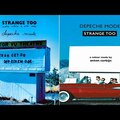In the first half of the '80s, when Depeche Mode was just a baby-faced synth-pop band singing bubblegum love songs, America couldn't be bothered to care. The boys from Basildon, England, were neither as pretty as Duran Duran nor as cartoonish as all those New Romantics on MTV, and singles like "Just Can't Get Enough" and "See You" remained largely underground sensations.
It wasn't until Depeche Mode toughened up and started singing about crazy things like S&M ("Master and Servant") and tolerating your fellow man ("People are People") that the group started making stateside headway. By 1988, DM had grown popular enough to sell out the Rose Bowl, but it still hadn't infiltrated the mainstream. That finally changed with Violator.

Released 25 years ago today, on March 19, 1990, the Mode's stellar seventh album was, in some ways, an unlikely pop smash. For years, songwriter, and musical mastermind Martin Gore had been exploring religion and kinky sex, and on Violator, he keeps on going. Gore name-checks Jesus on the lead single and ponders obsessive desire on most of the other eight tracks. This wasn't exactly stuff Paula Abdul or New Kids on the Block were singing about at the time.
As always, frontman Dave Gahan provides the perfect mouthpiece for Gore's tortured musings, crooning like the lascivious lounge singer he is. While that division of labor -- Martin writes 'em, Dave sings 'em -- was par for the course,Violator came together in manner atypical for the group. Instead of bringing in nearly finished demos, Gore passed barebones sketches to keyboardist Alan Wilder, who worked with co-producer Mark "Flood" Ellis on arrangements and textures.
That wasn't the only change. The addition of electric guitar gave the singles "Personal Jesus" and "Policy of Truth" a bluesy rock n' roll edge, and combined with Gore's irresistible melodies, that pushed the songs into the top 40. "Jesus" rose to No. 28 on the Hot 100, followed by "Enjoy the Silence," which climbed all the way to No. 8 -- DM's highest-ever placement. "Policy of Truth" reached No. 15, and Violator hit No. 7, besting the Mode's previous effort, 1987's Music for the Masses, by a full 28 spots.
The success of Violator brought Depeche Mode a whole new audience, and its next album, 1993's excellent Songs of Faith and Devotion, debuted atop the U.S. and U.K. charts. With the exception of the 2001 yawner Exciter, the band hasn't really released a dud since, and yet with each new album, the sweetest critical praise tends to sound something like "best album since Violator."
Read on for our track-by-track take on Depeche Mode's magnum opus, the standard by which all future explorations of sex, drugs, and spirituality shall be judged.
"World In My Eyes": The album begins with Gahan playing horndog travel agent, inviting a lover to follow him someplace where pleasure reigns supreme and everything else ceases to exist. Helping him seal the deal are two synth hooks (one blippy and industrial, the other urgent and needling), a driving beat, and his own persuasive vocals. Hedonism like this practically sells itself.
"The Sweetest Perfection": In some ways an inversion of the previous track, this creeping ballad with shuffling drums and lead vocals from Gore is all about powerlessness in the face of temptation. Whether "the sweetest injection" is a reference to sex or drugs, the inclusion of the word "infection" suggests a self-destructive aspect to the narrator's pursuit of pleasure.
"Personal Jesus": The Mode goes gothabilly with this tribute to obsessive love, inspired by Priscilla Presley's book about her life with Elvis. The King's ghost haunts the track, as Gore's twangy guitar adds a '50s Sun Records vibe to the synth-pop throb. Crooning lines like "Pick up the receiver, I'll make you a believer," Gahan is a natural sleaze-ball preacher man, and amazingly, this song didn't ruffle knickers in bible-thumping America. Released in late '89, it was DM's first top 40 single in five years.
"Halo": Gahan picks up where he left off on "World In My Eyes," making a harder pitch for a type of pleasure he now admits might be sinful. "When the walls come tumbling in," he sings, "though we may deserve it / it will be worth it." The music is cold and pounding, and the string sounds give an air of elegance that somehow makes the whole thing feel dirtier.
"Waiting for the Night": Unlike other pop songs with similar titles, this isn't about loving the nightlife or liking to boogie. Gahan is staring at the moon, enjoying the silence and tranquility and trying to block out the dread of daily existence. The lyrics rhyme "dark" and "stark," both of which describe the spare hum of synths in the background. If the six-minute runtime feels long, imagine how it feels to live nights like this.
"Enjoy the Silence": Depeche Mode's biggest hit began as a keyboard ballad that Wilder suggested the band turn into a dance tune. Good call. The lusty groove reinforces the lyrics, which once again center on a type of bliss best not overanalyzed. With applications in love, sex, pop music, and so many other aspects of life, "words are very unnecessary / they can only do harm" is among the finest lines Gore has written.
"Policy of Truth": Gore's guitar again steals the show, slicing through the chorus with a six-note switchblade of a riff. "Policy of Truth" is about keeping part of yourself hidden, and the Mode maintains a shadowy feel, even as it delivers one of its brightest choruses. That's the genius of Violator: It uses the machinery of pop to dig down into neuroses and psychosexual hang-ups everyone has but few dare to sing about.
"Blue Dress": The Big Bopper spoke the truth on 1958's "Chantilly Lace," a song about how pretty girls (or whatever makes you act real funny and spend your money) essentially "make the world go 'round." On "Blue Dress," Gore tweaks that idea, bringing barely contained desire and shades of self-loathing to an icy synth ballad he's famously called "pervy." "Say you believe / just how easy / it is to please me," he sings, just after instructing his lover to don the titular garment. "Because when you learn / you'll know what makes the world turn." Were he any skeevier, he'd go from Big Bopper to Buffalo Bill.
"Clean": After the cold sweat of "Blue Dress," a cleansing is very much in order. Fresh from a spiritual scrub-down, Gahan works dramatic magic over an unremarkable throb-and-whistle backing. It figures the song on Violator about redemption is the least memorable of the bunch, but the album had to end somehow. Where do dark tunnels lead but to the light?





